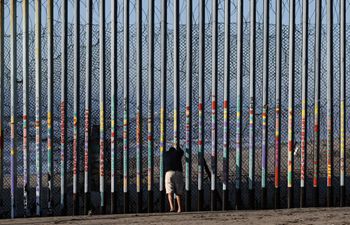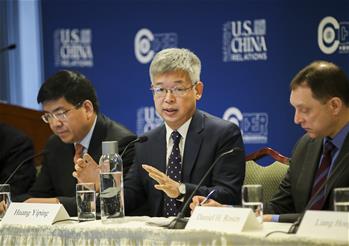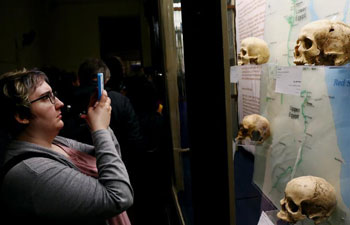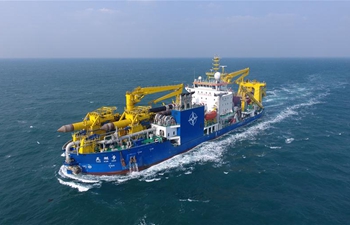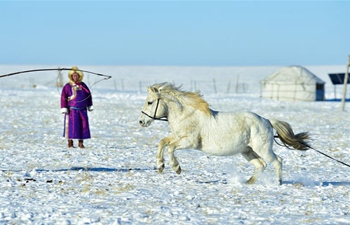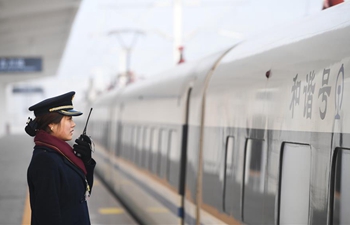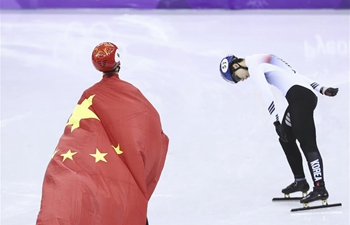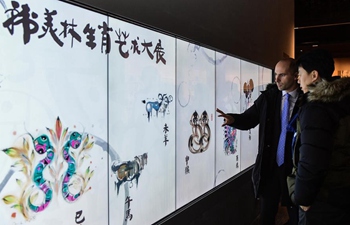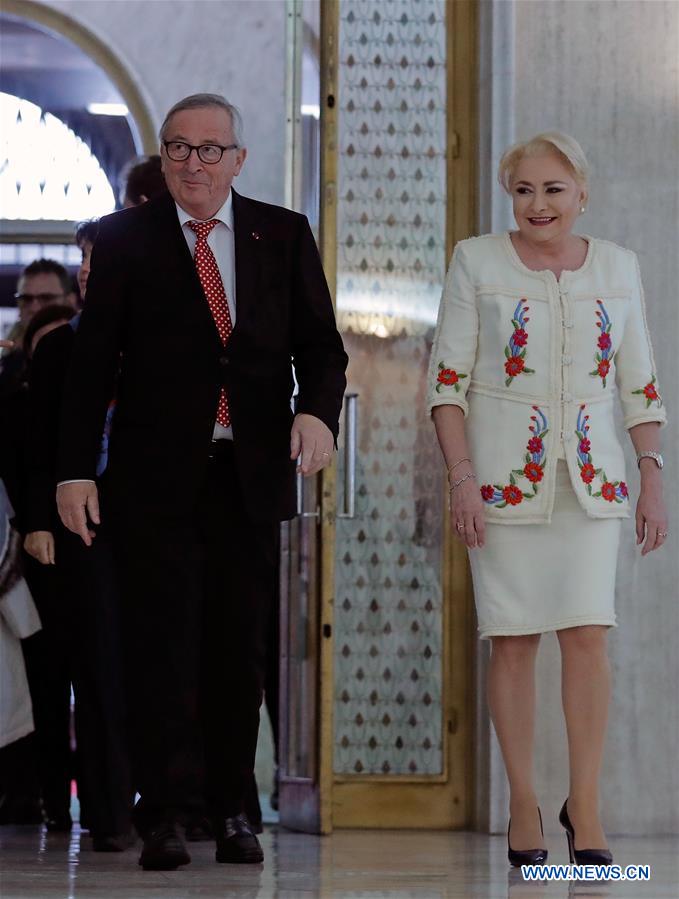
President of the European Commission Jean-Claude Juncker (L) is welcomed by Romania's Prime Minister Viorica Dancila at the Victoria Palace in Bucharest, Romania, Jan. 11, 2019. Romania's Presidency at the Council of the European Union (EU) takes place at a "difficult" time for Europe, said on Friday President of the European Commission Jean-Claude Juncker, stressing that the mandate "must ensure stability and offer hope." (Xinhua/Cristian Cristel)
by Lidia Moise
BUCHAREST, Jan. 11 (Xinhua) -- Romania officially launched its Presidency at the Council of the European Union (EU) in a grand inauguration ceremony late Thursday in Bucharest, attended by top leaders, senior officials and celebrities of the country and the EU.
The country will have confront major challenges, including Brexit upshot, the negotiations for the next long-term EU budget and the European elections, during its presidency of half a year, but it will be honored to host the most important summit for the bloc's future.
Meanwhile, Romania will have to deal with complicated issues as the migration files, or the rise of populism confirmed by the France's "yellow vests", but it will have the great chance to convince the skeptical European leaders that it deserves to join the Schengen space, together with Bulgaria.
SCHENGEN PROMISE
At the ceremony to launch Romania's first EU presidency, both European Commission chief Jean-Claude Juncker and the President of the European Parliament, Antonio Tajani, have pledged to support the country's accession to the Schengen Area.
"Romania's natural place is in Schengen. I pleaded in the European Parliament that Romania should be part of the Schengen area. I remain faithful to this issue - Romania must be part of the Schengen area," said Jean-Claude Juncker.
In his speech, Tajani extended the promise of support to Romania's neighbor country, Bulgaria.
"For some years now, Romania has met the technical accession criteria. The European Parliament has always supported the idea of Romania's membership of the Schengen Area. I should like to urge Member States which are blocking the accession process to rethink their stance. The accession of Romania and Bulgaria to the Schengen Area will enhance the security of all the countries in Europe and I hope that it will take place under your presidency," promised Tajani.
The rotating presidency does not provide a strong position of political leadership, but rather one of service provider to the European Council. But while presiding the EU Council, countries could pursue their key national projects as they enjoy some influence at the legislative level.
Schengen ascension wasn't set as an official priority, but it was suggested by the motto chosen by Romania's authorities: "Cohesion -- a common European value."
BREXIT, SENSIBLE DOSSIER
Romania will preside over the process of Brexit, Britain's departure from the EU, scheduled to conclude at the end of March, the most complicated challenge of the mandate.
Brexit process is a sensible issue for Romania, which, with almost 500,000 migrants, managed in just a few years after 2014 to become the second largest non-UK nationality. As of 2017, they were sending home 311 million euros (358 million U.S. dollars), almost 13 percent of Romanians' total remittances.
Indeed, said Tajani in Bucharest, extending the challenges' area: "The Brexit vote, trade wars, citizens' protests and the emergence of nationalist movements leave us no choice but to review the course to be taken...Romania must play a central role in shaping a new Europe. It is the essence of the Sibiu summit that will take place on May 9."
SIBIU SUMMIT
Six weeks after Brexit, and two weeks before the European Parliament elections, Romania will preside over an EU Summit in Sibiu, an opportunity for European leaders to express their perspective for the future of the Union. Romania's authorities hope that the summit will send "a message of unity at the level of the Union."
"What is at stake during the Romanian Presidency, as well as the informal European Council in Sibiu, is nothing less than the way we envisage our European future together," said Donald Tusk, the president of the European Council.
Thursday night, Tajani briefed on the most important topics that will be on the Sibiu summit's agenda.
"We need progress on the overhaul of the Dublin Regulation, which can no longer wait; on establishing a fairer internal market in which everyone - including web giants - pays taxes and plays by the rules; on an ambitious digital agenda; on completing the Banking Union; on establishing effective and democratic economic governance; on creating a level playing field for open and fair trade," he said.
EUROPEAN PARLIAMENT ELECTION
The next challenge for Romania's presidency will be European Parliament election in May, usually a low-key event with weak participation rates, but which are expected to receive more attention, as the Europeans are fearing a significant rise of EU-skeptical forces.
"We must also safeguard the right of our citizens to vote freely in the forthcoming European elections, by guaranteeing that the election campaign is not distorted by fake news designed to manipulate the voters," warned the president of the European Parliament.
Romania's EU Affairs minister, George Ciamba, said earlier in a conference that EU has to deal with new security challenges such as disinformation has become "one of the greatest challenges to our democracies." Joint efforts of the EU member states and the civil society are needed for efficient response, he added.
MONEY'S GAMBIT
Bucharest will also preside over extenuating battles over the next long-term EU budget, with an impressive 1.14-trillion-euro (1.31-trillion-U.S. Dollar) blueprint for the 2021-2027 Multiannual Financial Framework (MFF). Although a final deal was supposed to be reach before the European Parliament election, chances are to be settled by fall. But President Tajani mentioned also that the European Parliament has adopted a draft budget commensurate with some priorities, some of them of greatest importance for Romania, such as cohesion funds or European funds for agriculture.
"It is essential that the EU's next Multiannual Financial Framework should be policy-driven, reflect citizens' priorities for an efficient Europe. It would be a grave error to make cuts in the cohesion funds and in farm spending. We want a budget which boosts investment in the real economy. We want to develop modern European infrastructure, invest much more in research and innovation and support the real drivers of the economy, small and medium-sized firms. We need to set aside more resources to foster the energy transition and the circular economy, both of which are essential to the future of our planet," Tajani said.
As the European elections will be followed by a changing of the guard in European top jobs, Romania's presidency will also deal with the transitions at EU institutional level for the next Commission and Parliament in the last month of its mandate.
HARD ROUTINE TASKS
But the consistent task of Romania's presidency will the pile of more than 250 files currently active on the agenda of the European Union, in different stages of negotiation. "There are 48 legislative files that are in fact from a multi-annual financial perspective, which will have to be agreed on at least at the level of order, words and terminology," mentioned Ciamba in a press conference at the beginning of this week.
The Romanian Presidency opens the Trio of Presidencies which includes Finland and Croatia, and it will be the final Presidency acting throughout the current legislative cycle of the European Parliament.
